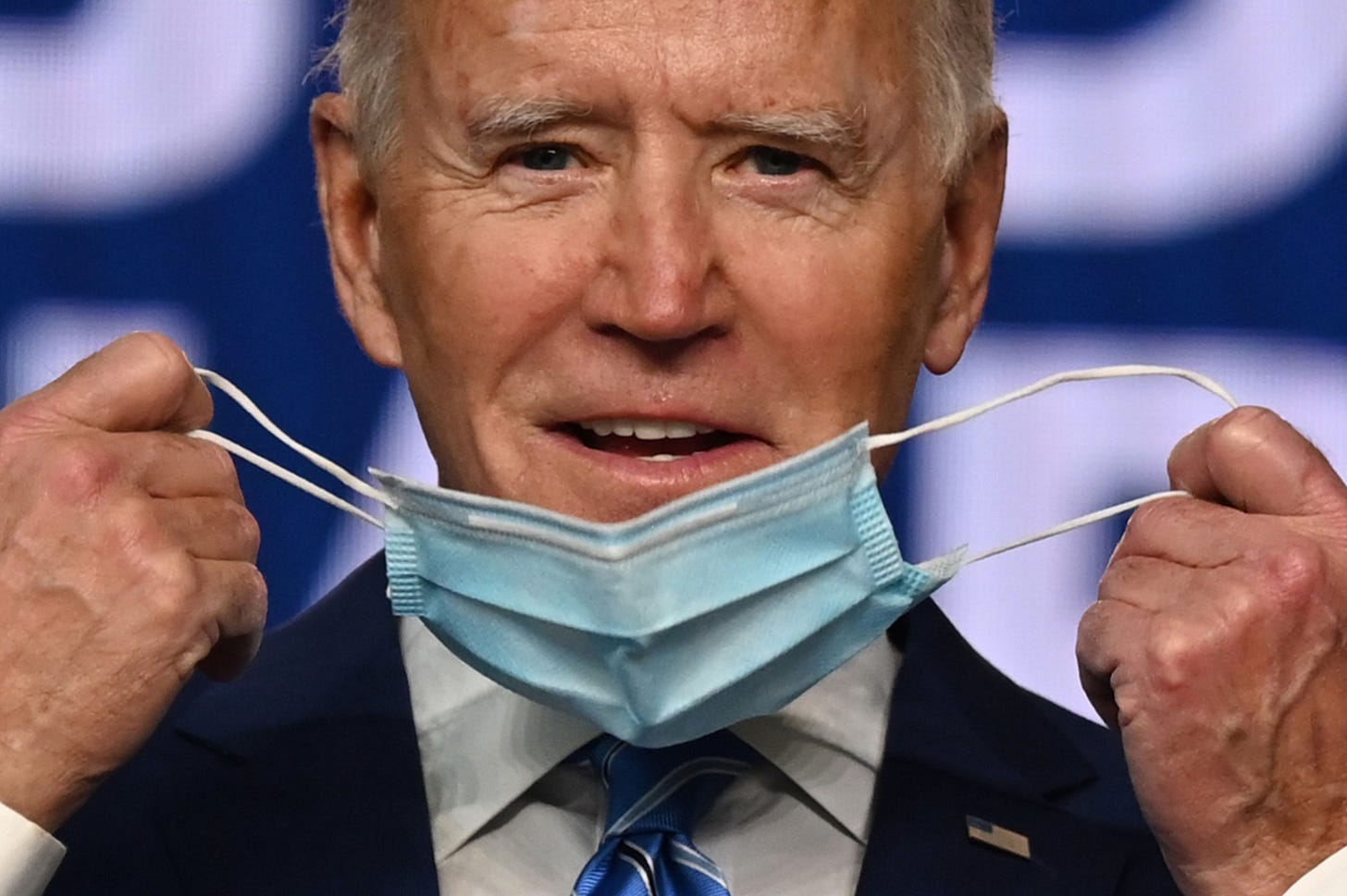This Is How Biden Can Lead with Science
It starts with being mindful of your own priors.
The Biden administration will soon take over America’s management of the COVID-19 pandemic. There is a great deal of work to be done and it should start with Democrats and progressives making a realistic assessment of their own blind spots.
Last week Californians saw our governor, along with (amazingly) top executives from the California Medical Association, disregard their own advice, and dine maskless and indoors at the French Laundry.
In another instance, at least nine Golden State legislators (both Democrats and Republicans) flew to Maui’s elegant Fairmont Kea Lani—“Hawaii’s only all-suite and villa luxury resort”—despite a health advisory on out-of-state travel, and ever-more intensive restrictions within the state as the virus surges.
Meanwhile, there has been a tendency to embrace the World Health Organization as the gold-standard, simply because it found itself in conflict with Donald Trump. But the reality is that the WHO has revealed itself to be at least occasionally untrustworthy, by coddling China’s repressive regime, misrepresenting a COVID-19 outbreak at its own headquarters, and finding the time, in the midst of a global pandemic, to spend hours bashing Israel.
None of this is meant to create a false equivalence with the scientific depredations of the Trump administration, which mismanaged this crisis in ways which stagger the mind.
And to his enormous credit, Joe Biden has exhibited laudably consistent behavior in his approach to COVID-19 risk, setting an example of personal conduct that his administration—all of America, actually—will do well to emulate.
But the responsibility of power is a double-edged sword. Democrats will now have a greater ability to take actions that help public health. But mistakes or hypocrisies—like those above—will be more damaging to public health. Which is why it’s important for the party to have a clear-eyed view of itself.
A more difficult challenge for progressives will be resisting the tendency to substitute their own moral judgement for scientific judgement.
Consider the response of progressive public health advocates to this summer’s social justice marches. Many explicitly argued that the virtue of the social justice protests more than offset the associated health risks. Over 1,300 epidemiologists and health workers signed a letter contending that, while previous anti-lockdown protests were “rooted in white nationalism and run contrary to respect for Black lives,” the social justice marches, which protested systemic racism, “must be supported.”
“As public health advocates,” the letter said, “we do not condemn these gatherings as risky for Covid-19 transmission. We support them as vital to the national public health.”
This letter was a triumph of politics over science and one that ultimately hurt the credibility of the scientific establishment at a moment when the value of credibility can be measured in refrigerated mobile morgues.
We often idealize the process of science, imaging it as occurring in a distinct and sterile space, pursued by detached and disinterested researchers and evaluated by rigid, objective, and inviolable criteria. That is a caricature. Physicians and scientists are people, and their judgements can influenced—at least on the margins—by factors beyond the strictly scientific.
The influence of physician moral values on scientific evaluation was revealed in a remarkable 2012 New England Journal of Medicine (NEJM) paper—published, to their credit, by a group of frequent industry critics. The authors found that when identical scientific papers were presented to physicians, the doctors were much more likely to view the research as rigorous if it was described as government-funded than industry-funded—even though the actual substance of the work was exactly the same.
Capturing the implications of this powerful but disturbing study, Dr. Jeffrey Drazen, the Editor of the NEJM at the time, pleaded with physicians evaluating science to “believe the data.”
That’s easier said than done. We harbor a natural sympathy for causes we may agree with—like the summer’s social justice marches, perhaps —and for organizations like the WHO whose mission we may strongly support. Consequently, we are drawn to afford these causes and organizations greater scientific leniency than their behavior or data may intrinsically merit.
Conversely, as demonstrated in the NEJM study, there’s a well-rehearsed reflex to resist data emanating from those with whom we oppose, whether it’s an academic competitor, an industry scientist, or simply someone whose political views we dislike.
The Biden administration will start with a great many challenges. One of them will be to avoid the trap of replacing the destructive biases of the Trump administration with biases of their own.
By authentically welcoming a range of perspectives—and insisting on a common standard of evaluation for all science, rather than privileging data based on political affinity rather than scientific quality—the incoming team can ensure the very best science in the world is utilized to surface, articulate, and fashion the most effective solutions.
And by consistently walking the talk, the administration can increase the chance that these solutions stick.


